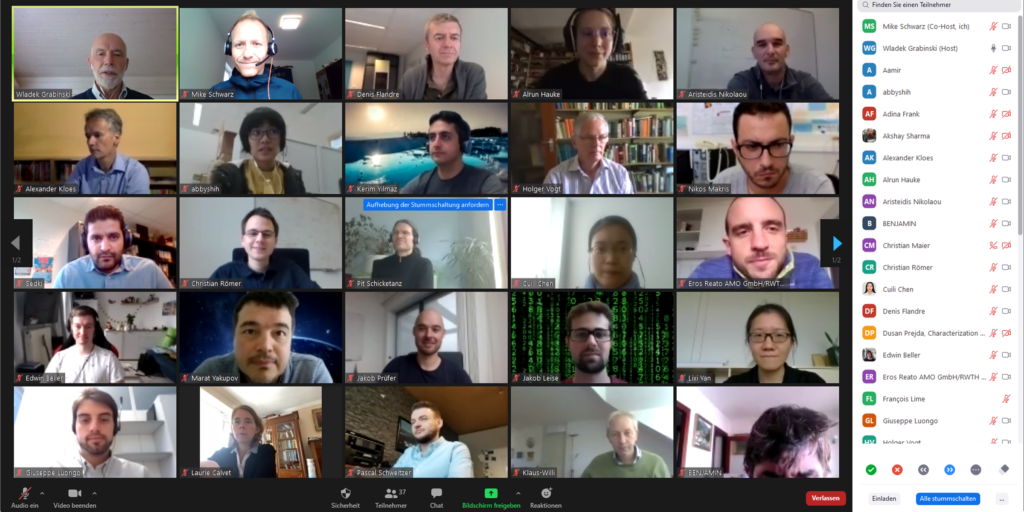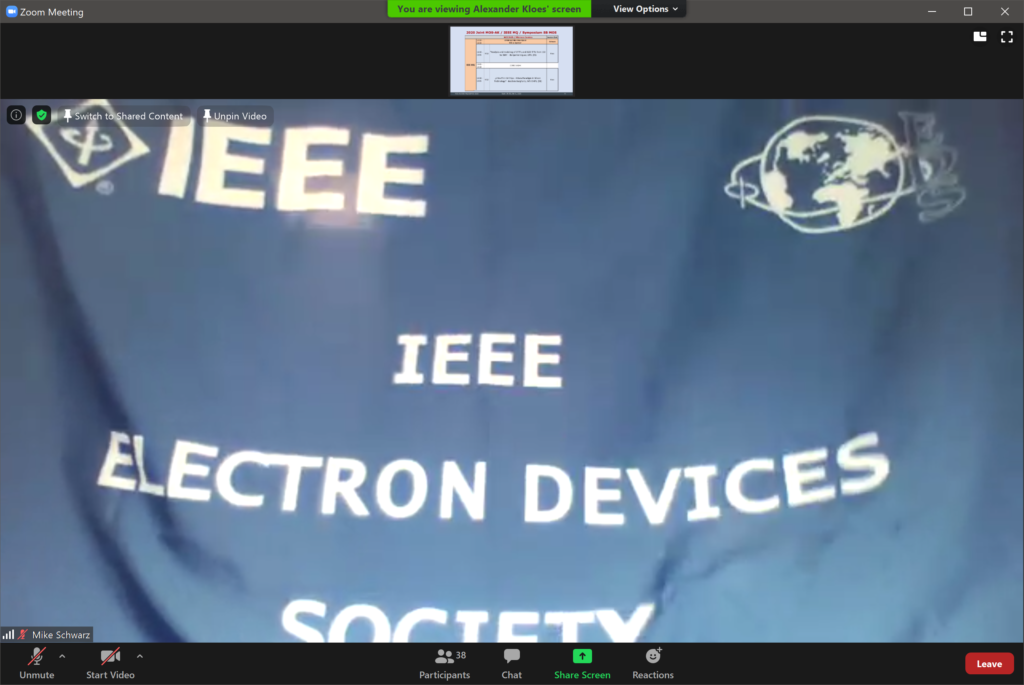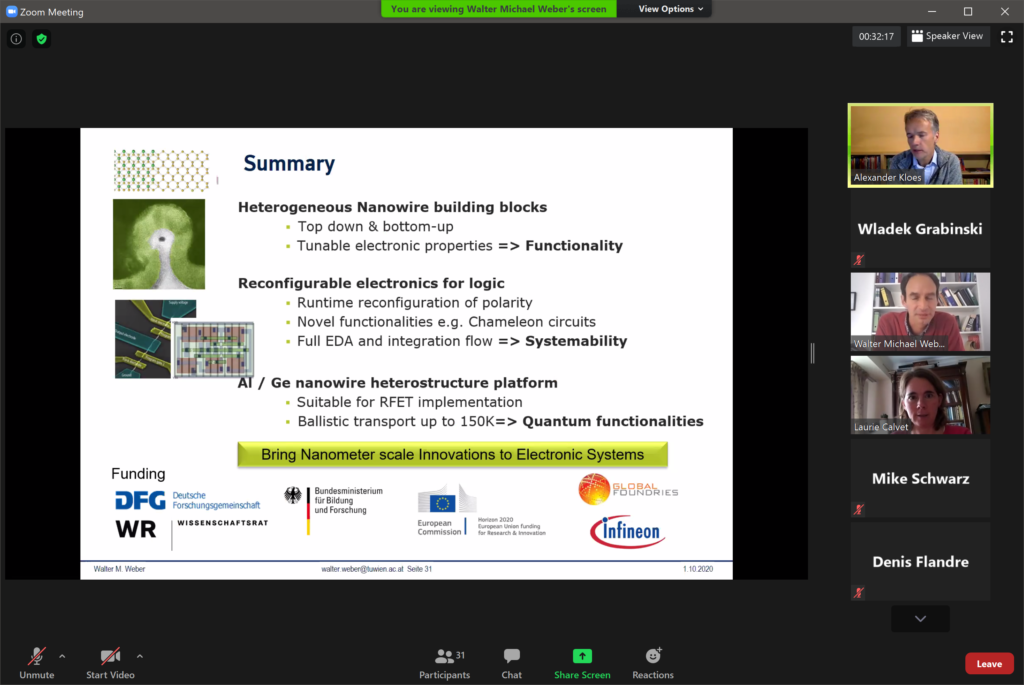Joint Spring MOS-AK Workshop and Symposium on Schottky Barrier MOS (SB-MOS) devices with IEEE EDS Mini-Colloquium on „Non-conventional Devices and Technologies“
The Joint Spring MOS-AK Workshop and Symposium on Schottky Barrier MOS (SB-MOS) devices with IEEE EDS Mini-Colloquium on „Non-conventional Devices and Technologies“was held from September 29th to October 1st, 2020. While it was initially planned for spring at THM University of Applied Sciences in Giessen (Germany), it was shifted to the early autumn due to the COVID-19 pandemic. However, finally the local organizers of NanoP (Competence Center for Nanotechnology and Photonics) decided to move it to Zoom and perform it virtually. It was sponsored by THM, the EDS Germany Chapter, the IEEE Young Professionals Germany Affinity Group, and the AdMOS company. The event was attended by 69 IEEE members and 115 non IEEE members (guests) from 25 countries during the three days.
The event started with the MOS-AK workshop. It was opened by Dr. Wladek Grabinski and Prof. Alexander Kloes. The first presentation was given by Dr. Markus Mohr from Ulm University and entitled “Fabrication and Application of Nanocrystalline Diamond Thin Films and Hybrid Diamond-Silicon Sensor Applications”.

After a short coffee break the event continued with a talk by Aristeidis Nikolaou from THM on the topic of “Statistical circuit analysis by NOVA (Noise Based Variability Approach)”. It followed a presentation by Prof. Alexander Kloes with an overview on “Approaches for analytical (compact) modeling of tunneling current in MOS transistors”.
After the lunch the afternoon session was opened by Mahimna Dwivedi from AdMOS on the “Modeling of GaN HEMTs on Silicon Substrate” a collaboration work with IMS Chips. Then Lixi Yan from University of Stuttgart gave insights on “Adopting the Industry-standard CMOS Models for Si Vertical Power MOSFETs”.
The first day was closed after a coffee break by an “Overview of Gnucap, the GNU Circuit Analysis Package” presented by Al Davis from Gnugap Team USA and Axel Fischer from SweepMe! with a talk on the software “SweepMe! – a modular, flexible, and versatile software platform for device characterization”.
The second day continued with the MOS-AK and a talk on “Injection Barrier Modification by Organic Monolayers” by Dr. Alrun Hauke from Philipps-Universität Marburg. It was followed by a presentation from UC Louvain on the topic of “Quantitative Investigation of the Interplay between Intrinsic Transistor Noise and Circuit Nonlinearities” given by Leopold Van Brandt.
The MOS-AK was closed by the talks of Dr. Ghader Darbandy and Dr. Mike Schwarz. Dr. Darbandy presented the work on “Emerging Devices: RFET and OPBT” and Dr. Schwarz methodologies for high volume productions by “Simulation and Modeling of Semiconductor Devices in MEMS”. The MOS-AK was finally attended by 73 participants.

After the lunch, Dr. Schwarz opened as German Chapter chair the IEEE MQ on “Non-conventional Devices and Technologies” (see separate detailed article). Here, talks by the Distinguished Lecturers Prof. Benjamin Iniguez from Universitaet Rovira I Virgili, Prof. Joachim Burghartz from IMS Chips, Dr. Wladek Grabinski from MOS-AK, Dr. Frank Schwierz from TU Ilmenau, and Prof. Tibor Grasser from TU Vienna gave various presentations.
The first one was given by Prof. Benjamin Iniguez from Universitaet Rovira I Virgili on the topic “Analysis and modeling of OTFTs and IGZO TFTs from 150 to 350K”. After a coffee break, Prof. Joachim Burghartz from IMS Chips gave a talk on “Ultra-Thin Si Chips – A New Paradigm in Silicon Technology”. Intensive discussions on both lectures with various Q&A followed after each talk. The second day ended after Prof. Burghartz talk.
The final day continued with the IEEE MQ and the talk by Dr. Wladek Grabinski from MOS-AK. He was referring on the topic of “FOSS TCAD/EDA Tools for Advanced Compact Modeling”. Afterwards, Dr. Frank Schwierz from TU Ilmenau gave a very detailed lecture on “2D Electronics – Opportunities and Challenges”. The Mini-Colloquium on „Non-conventional Devices and Technologies“was closed by the talk of Prof. Tibor Grasser from TU Vienna entitled “Stability and Reliability of 2D Transistors”. The IEEE MQ was finally attended by 71 participants.
After the lunch, the 4th Symposium on Schottky Barrier MOS Devices was opened with some historical remarks by Prof. Mike Schwarz and Dr. Laurie Calvet. Then they introduced the first speaker Dr. Zhenxing Wang from AMO GmbH. Dr. Wang gave a talk on “Metal-Insulator-Graphene RF Diodes: From Devices to Integrated Circuits”. Afterwards, Dr. Laurie Calvet from Universite Saclay Paris presented a talk on “Schottky barrier devices for neuromorphic computing”.

After a coffee break Prof. Walter Weber from TU Vienna gave some insights on heterostructures during the presentation entitled “Nanowire metal-semiconductor heterostructures for functionality enhancement and quantum transport”. Finally, Dr. Hans Kleemann from TU Dresden presented on the topic of “Schottky-type Contacts in Ultra-Short Channel Organic Semiconductor Devices for GHz-Operation”.The Symposium on SBMOS was finally attended by 40 participants.
Finally, the organizers Prof. Alexander Kloes, Dr. Wladek Grabinski, Dr. Laurie Calvet, and Prof. Mike Schwarz thanked all presenters and participants for this fantastic event. All of you made it happened!
